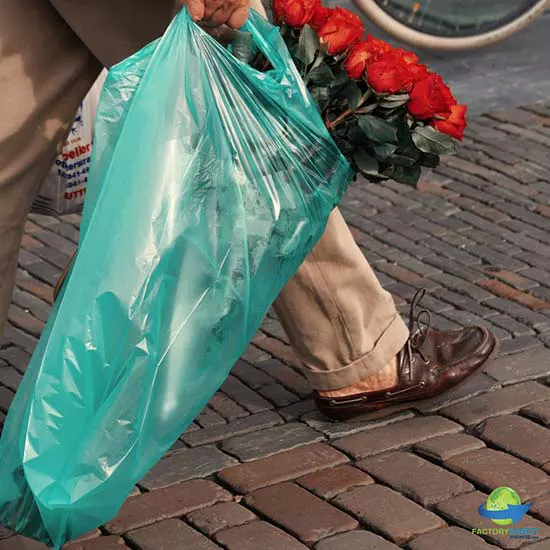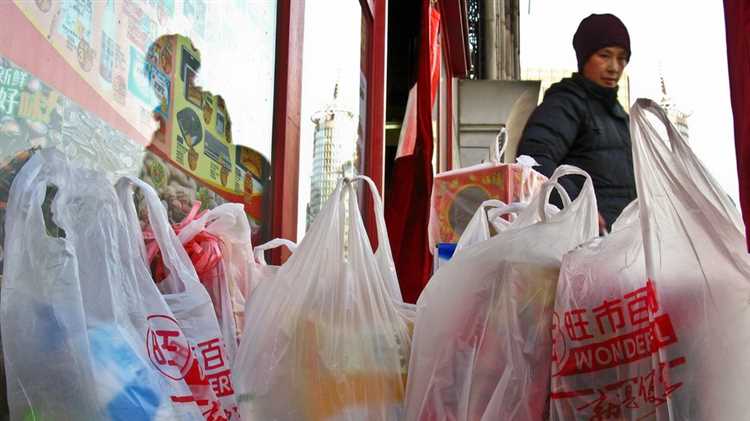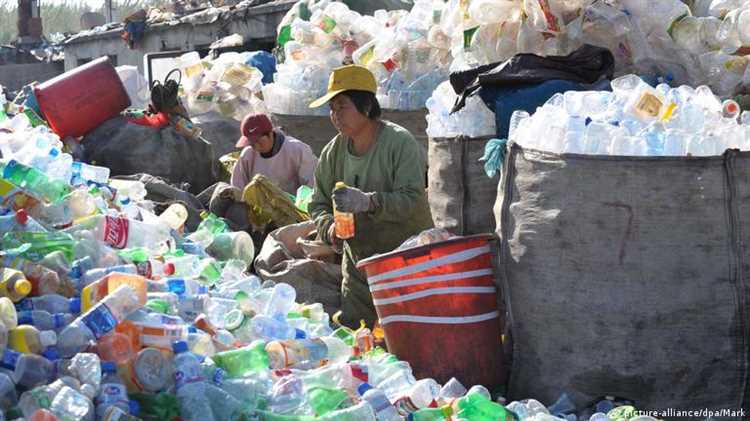
In an effort to tackle the pervasive problem of plastic pollution, China implemented a nationwide ban on plastic bags in 2008, marking a significant step towards a greener future. This bold and far-reaching decision has had a profound impact not only on China’s environment, but also on the global conversation surrounding plastic waste.
The ban, which prohibits the production, sale, and use of ultra-thin plastic bags, has been successful in reducing China’s plastic consumption by an estimated 66%, equivalent to around 40 billion plastic bags per year. By eliminating these single-use bags, China has significantly decreased the amount of plastic waste ending up in landfills and polluting its rivers, lakes, and oceans.
Not only has the ban been effective in reducing plastic waste, it has also spurred innovation in the development of alternative materials. Many Chinese consumers have embraced reusable bags made from fabric, paper, or other biodegradable materials as a more sustainable option. This shift in consumer behavior has contributed to a cultural shift towards more eco-friendly practices, further propelling China’s efforts to combat plastic pollution.
China’s plastic bag ban has not been without its challenges, however. While it has been successful in reducing the use of ultra-thin plastic bags, the production and use of thicker plastic bags, as well as other single-use plastic items, such as straws and cutlery, continue to be a concern. Efforts are being made to address this issue and further restrict the use of these items, highlighting the ongoing commitment of the Chinese government and its people to tackle plastic pollution head-on.
- The Environmental Impact
- The Government’s Efforts
- The Alternatives to Plastic
- 1. Paper
- 2. Biodegradable Plastics
- 3. Reusable Bags
- The Effect on Retailers
- Customer behavior changed
- Positive environmental impact
- The International Response
- The Future of Plastic Bag Use in China
- Transition to reusable bags:
- Collaboration with other countries:
- Q&A:
- What is the plastic bag ban in China?
- When did the plastic bag ban in China take effect?
- What are the alternatives to plastic bags in China?
- Has the plastic bag ban been successful in China?
The Environmental Impact

China’s plastic bag ban has had a significant positive impact on the environment. Prior to the ban, China was one of the world’s largest consumers and producers of plastic bags, resulting in vast amounts of plastic waste being generated each year. These plastic bags, often used only once, would end up in landfills and oceans, causing serious harm to the ecosystem.
With the ban in place, the consumption of plastic bags has significantly decreased. It is estimated that China’s ban has prevented the use of billions of plastic bags annually. This has resulted in a substantial reduction in plastic waste and pollution. By reducing the production and use of plastic bags, China has taken a major step towards mitigating plastic pollution and promoting a more sustainable future.
The ban has also led to a shift in consumer behavior. With the unavailability of free plastic bags, people have started using reusable bags and adopting more sustainable practices. This not only helps to reduce plastic waste but also encourages individuals to be more mindful of their consumption habits.
Furthermore, the ban has also prompted the development of alternative materials for packaging. The emphasis on replacing plastic bags with biodegradable or reusable options has sparked innovation in the industry. Manufacturers are now producing more eco-friendly bags made from materials such as cloth, paper, or bioplastics. These alternatives are not only more environmentally friendly but also provide economic and employment opportunities.
In conclusion, China’s plastic bag ban has had a positive environmental impact by reducing plastic waste and pollution, promoting sustainable practices, and stimulating innovation in packaging materials. It serves as an example for other countries to follow in the fight against plastic pollution and the promotion of a more sustainable future.
The Government’s Efforts

The Chinese government has launched several initiatives to combat the plastic bag problem in the country. In 2008, they implemented a nationwide ban on ultra-thin plastic bags, which had been a major contributor to the waste problem in China.
The ban led to a significant decrease in the use of plastic bags, with reports suggesting a reduction of over 40 billion bags in the first year alone. It also encouraged the development of alternative packaging materials, such as reusable bags and biodegradable options.
Furthermore, the government has been working to educate the public about the environmental impact of plastic bags and the benefits of using more sustainable alternatives. They have launched campaigns and provided resources to raise awareness about the issue and promote behavior change.
In addition to the ban, the government has also imposed restrictions on the production and sale of plastic bags. Manufacturers and retailers are required to meet certain standards, including using thicker materials and complying with labeling requirements.
Overall, the government’s efforts have been successful in reducing the use of plastic bags and raising awareness about the issue. However, there is still more work to be done to address the broader issue of plastic waste in China.
The Alternatives to Plastic
As the harmful effects of plastic become more apparent, it is crucial to find alternative materials that are more sustainable and environmentally friendly. Here are some promising alternatives to plastic:
1. Paper
Paper bags and containers are a popular alternative to plastic. They are biodegradable and can be recycled multiple times. However, it is important to consider the environmental impact of paper production, as it can contribute to deforestation.
2. Biodegradable Plastics
Biodegradable plastics are made from organic materials that can break down naturally over time. These plastics can be made from cornstarch, vegetable oil, or other plant-based materials. While they are a better alternative to traditional plastics, they still require specific conditions to break down completely.
3. Reusable Bags
One of the most effective alternatives to single-use plastic bags is the use of reusable bags. These bags are made from durable materials such as canvas, jute, or cotton, and can be used multiple times. Many countries have implemented initiatives to encourage the use of reusable bags through incentives or regulations.
It is important to note that no alternative material is without its drawbacks. Each alternative has its own set of environmental considerations, and the best solution may vary depending on the specific use case. However, by reducing our reliance on single-use plastics and adopting reusable and biodegradable alternatives, we can make a significant impact on reducing plastic pollution.
The Effect on Retailers
China’s plastic bag ban has had a significant impact on retailers throughout the country. With the ban in place, retailers have been forced to find alternatives to plastic bags for their customers to carry their purchases. This has led to both challenges and opportunities for retailers.
One of the main challenges retailers have faced is the increased cost of providing alternative bags. While plastic bags were cheap and easily accessible, the alternatives, such as paper or cloth bags, are more expensive to produce. This has put a strain on retailers’ budgets, especially smaller businesses that may not have the resources to absorb the additional cost.
However, the ban has also opened up opportunities for retailers to differentiate themselves and attract environmentally-conscious consumers. Many retailers have started offering reusable bags for sale, which not only provides a more sustainable option for customers but also generates additional revenue for the retailer. By offering stylish and durable reusable bags, retailers can create a positive brand image and attract customers who value sustainability.
Customer behavior changed
Another effect of the plastic bag ban on retailers is the change in customer behavior. With plastic bags no longer readily available, customers have had to adjust their shopping habits. Many customers now bring their own bags when they go shopping, which can lead to increased loyalty to retailers that support their sustainable choices.
Retailers have also had to adapt their packaging strategies and find alternative ways to package products for customers. This has led to innovations such as using biodegradable or compostable packaging materials, which align with the goals of the plastic bag ban and appeal to environmentally-conscious customers.
Positive environmental impact
Overall, the plastic bag ban has had a positive environmental impact, reducing the amount of plastic waste generated in China. Retailers have played a crucial role in this by adapting to the ban and providing customers with alternative options. By embracing more sustainable practices, retailers have not only reduced their environmental footprint but also positioned themselves as responsible businesses in the eyes of their customers and the broader community.
The International Response
China’s plastic bag ban has had ripple effects around the world, inspiring other countries to take action to reduce plastic waste. Many nations have implemented their own plastic bag bans or introduced fees on single-use bags. Some of the notable international responses to China’s ban include:
- In 2008, Bangladesh became the first country in the world to implement a nationwide ban on plastic bags in response to China’s ban. The ban aims to reduce the environmental impact of plastic bags in the country.
- In 2016, Kenya implemented one of the strictest plastic bag bans in the world, with penalties of up to four years in prison or fines of $40,000 for using, selling, or manufacturing plastic bags.
- In 2017, France introduced a ban on single-use plastic bags, along with several other measures to reduce plastic pollution. The ban applies to all single-use bags, including those made from biodegradable materials.
- In 2020, New Zealand announced a nationwide ban on single-use plastic bags, following the lead of many other countries in the Asia-Pacific region. The ban aims to reduce the estimated 750 million plastic bags used in New Zealand each year.
- Other countries that have implemented or are considering plastic bag bans include Australia, Canada, India, Italy, South Africa, Taiwan, and the United Kingdom.
The international response to China’s plastic bag ban demonstrates the growing global awareness of the need to reduce plastic waste and protect the environment. As more countries take action, it is hoped that the cumulative impact will be a significant reduction in plastic pollution and a shift towards more sustainable alternatives.
The Future of Plastic Bag Use in China
China has taken significant steps in reducing plastic bag usage and has set the stage for a sustainable future. The plastic bag ban implemented in 2008 was just the beginning of a larger plan to tackle the plastic waste problem in the country.
Increasing awareness: The Chinese government has been actively promoting awareness about the harmful effects of plastic bags on the environment and encouraging citizens to adopt eco-friendly alternatives. Through public education campaigns and initiatives, the government has successfully raised awareness about the importance of reducing plastic waste.
Legislation and enforcement: Strict regulations have been put in place to ensure the effective implementation of the plastic bag ban. Heavy fines and penalties are imposed on businesses and individuals found violating the ban. This has significantly deterred the use of plastic bags and encouraged businesses and consumers to find alternative solutions.
Transition to reusable bags:
The future of plastic bag use in China lies in the widespread adoption of reusable bags. The government has actively promoted the use of cloth bags, canvas bags, and other reusable options as a sustainable alternative to plastic bags. Many businesses have also started offering incentives for customers to bring their own bags, further encouraging the switch to reusable options.
Investment in research and innovation: China is investing in research and innovation to develop eco-friendly alternatives to plastic bags. Scientists and entrepreneurs are working on biodegradable and compostable materials that can replace plastic bags without causing harm to the environment. This investment in research and innovation shows a commitment to finding sustainable solutions to the plastic waste problem.
Collaboration with other countries:
China has recognized that plastic pollution is a global problem that requires collective action. The government has been actively collaborating with other countries to share experiences, knowledge, and best practices in managing plastic waste. Through international partnerships and cooperation, China aims to address the issue of plastic bag use not just within its borders but also on a global scale.
Continued efforts for a plastic-free future: The future of plastic bag use in China depends on continued efforts by the government, businesses, and individuals. By promoting public awareness, enforcing regulations, encouraging the use of reusable bags, investing in research, and collaborating with other countries, China is building a future where plastic bags are no longer a threat to the environment.
Q&A:
What is the plastic bag ban in China?
The plastic bag ban in China is a government-imposed regulation that prohibits the production, sale, and use of thin plastic bags. The purpose of this ban is to reduce plastic waste and environmental pollution.
When did the plastic bag ban in China take effect?
The plastic bag ban in China took effect on June 1, 2008. It was implemented to coincide with the Olympic Games held in Beijing that year.
What are the alternatives to plastic bags in China?
There are several alternatives to plastic bags in China. Some popular options include reusable cloth bags, paper bags, and biodegradable bags made from materials like cornstarch or cassava.
Has the plastic bag ban been successful in China?
Yes, the plastic bag ban in China has been largely successful. Studies have shown that the use of plastic bags has significantly decreased since the ban was implemented. However, there are still challenges in enforcing the ban and reducing overall plastic waste.